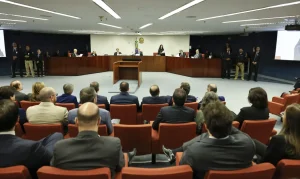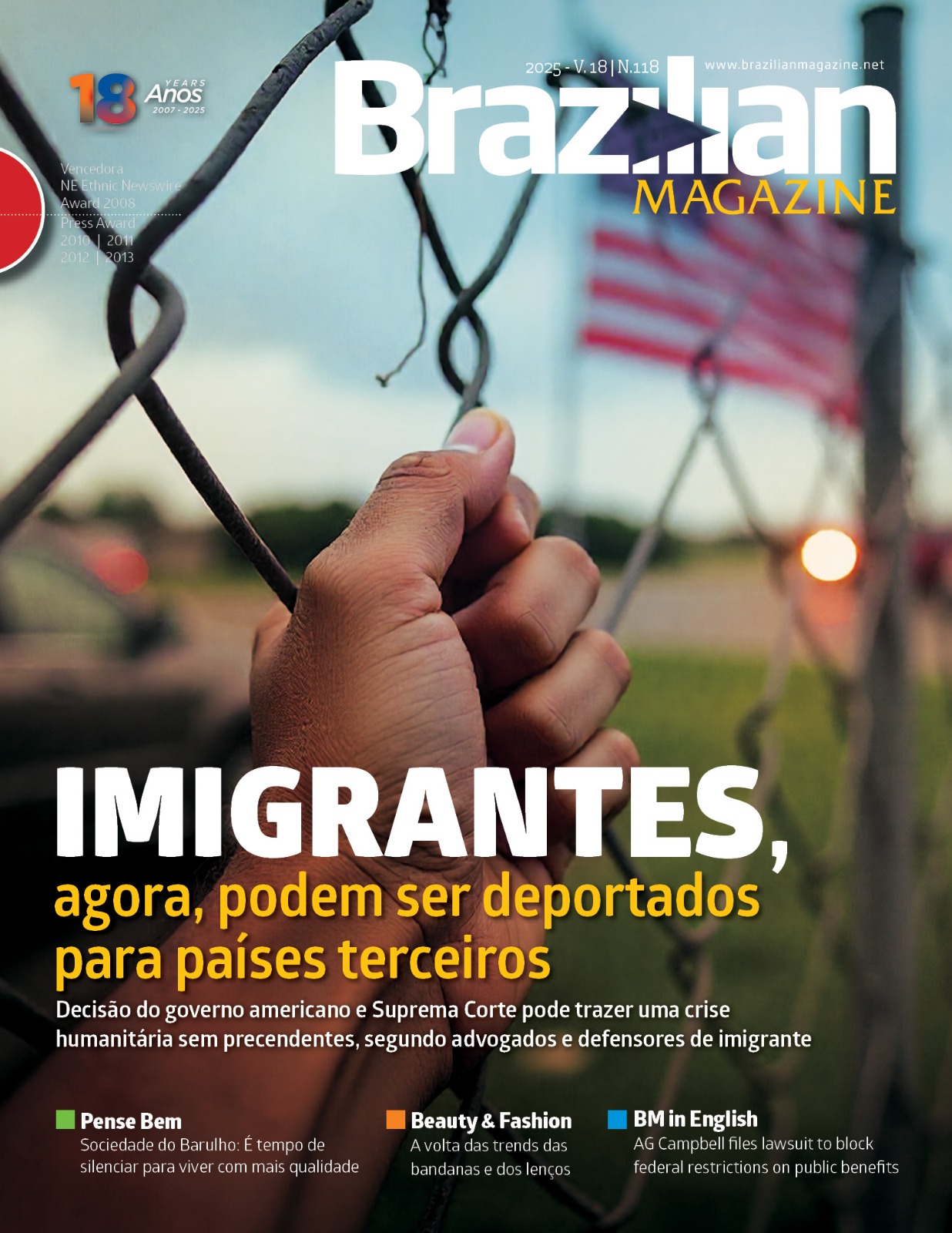Sempre sonhei em ser mãe, mas decidi que não teria filhos antes dos 30. Queria aproveitar a juventude sem pressa, investir nos estudos, construir minha carreira e, principalmente, me conhecer melhor antes de assumir a grande responsabilidade de cuidar de outro ser humano. Foi um plano consciente — e consegui cumpri-lo.
O que eu não planejei foi que, enquanto meus filhos entrassem na adolescência, eu estaria entrando na perimenopausa. Resultado? Estamos todos sob o mesmo teto, com os hormônios em revolução e o humor oscilando como as marés. Daniel, de 15 anos, vive a efervescência da testosterona. Benjamin, com 11, começa a ensaiar seus primeiros passos na pré-adolescência. E eu? Bem… entre calorões, noites mal dormidas e uma irritabilidade que parece vir de brinde com a idade, vou tentando manter o barco firme. Às vezes, parece mesmo que somos três em alto-mar, cada um enfrentando a própria maré. Mas se tem uma frase que guia minha maternidade, é essa: não é sobre controlar as ondas, é sobre aprender a surfar juntos.
Falar sobre menopausa ainda é tabu para muitas mulheres — mas eu acredito que esse é um tema que precisa ser abordado com naturalidade, informação e, por que não, coragem. Assim como planejamos tantas outras fases da vida, podemos (e devemos) planejar essa também. Afinal, ela não precisa ser um fardo, e sim mais um capítulo de autoconhecimento e cuidado.
E aqui vale uma pequena explicação, que aprendi no caminho: a perimenopausa (também chamada de pré-menopausa) e a menopausa são etapas diferentes dentro de um mesmo processo chamado climatério — que é o período de transição da vida reprodutiva para a não reprodutiva da mulher. A perimenopausa é o momento em que os hormônios começam a oscilar, os ciclos menstruais se tornam irregulares, e os famosos sintomas aparecem. Já a menopausa, de fato, é marcada pela ausência total da menstruação por 12 meses consecutivos — é como se fosse o “ponto final” do capítulo fértil da vida.
E aqui vai um plot twist cheio de esperança: meu filho mais velho aprendeu sobre menopausa na escola! Daniel, com seu jeito doce e atento, percebe quando não estou no meu “modo normal” e tenta suavizar o clima. Às vezes com um elogio inesperado, às vezes com uma piada que me arranca uma gargalhada no meio do caos hormonal. É emocionante ver um menino crescendo com essa consciência e sensibilidade — algo impensável para os adolescentes da minha época.
Claro, nem tudo são flores. A ciência explica bem o que acontece no corpo feminino durante a perimenopausa: queda de estrogênio e progesterona, oscilações emocionais, ansiedade, sensibilidade… Enquanto isso, os cérebros adolescentes reorganizam tudo e vivem cada emoção no volume máximo. Mas o conhecimento me trouxe ferramentas, e algumas estratégias têm me ajudado bastante — quem sabe ajudem outras mulheres por aí também:
- Autoconhecimento: entender que parte da irritabilidade tem base hormonal me ajuda a não me culpar tanto (nem culpar os outros).
- Diálogo: falo abertamente com meus filhos sobre o que estou vivendo — e incentivo que façam o mesmo. Compartilhar humaniza.
- Cuidados diários: yoga, meditação, chá de camomila e sono regulado (quando dá!) são aliados preciosos.
- Humor: às vezes, rir da própria TPM 2.0 é o único jeito de manter a sanidade.
E, olhando para trás, percebo o quanto sou privilegiada. A geração da minha mãe, da minha avó — e de tantas outras mulheres — mal sabia o que estava acontecendo com seus corpos. Eram tachadas de loucas, histéricas, ou simplesmente silenciadas. Hoje, com informação acessível e figuras públicas como Fernanda Lima e Claudia Raia abrindo o jogo sobre a menopausa, temos mais voz, mais consciência e menos vergonha.
Viver essa fase com planejamento e autocuidado é, pra mim, um ato de amor-próprio — e também um presente para os meus filhos. Eles crescem aprendendo que saúde, corpo e mente são assuntos sérios, mas também naturais. E que está tudo bem não estar bem o tempo todo. No fim das contas, estamos todos surfando juntos — às vezes caímos da prancha, damos risada, engolimos um pouco de água… mas seguimos, juntos, aprendendo a surfar as ondas da vida com leveza, afeto e muita presença.
in english
Menopause & Adolescence: In the Same Boat, Learning to Surf Together
I always dreamed of becoming a mother, but I decided I wouldn’t have children before turning 30. I wanted to enjoy my youth without rushing, invest in my education, build my career, and, most importantly, get to know myself better before taking on the huge responsibility of motherhood. It was a conscious plan — and I followed through with it. What I didn’t plan was that, just as my kids would be entering adolescence, I’d be entering perimenopause. So here we are: all under the same roof, riding our own hormonal roller coasters. Daniel, 15, is swimming in teenage testosterone. Benjamin, 11, is just starting to dip his toes into pre-adolescence. And me? I’m riding the waves of hot flashes, sleepless nights, and a level of irritability I definitely didn’t ask for.
Some days, it really does feel like we’re three people out at sea, each paddling through our own tide. But if there’s one phrase that guides my motherhood, it’s this:
It’s not about controlling the waves — it’s about learning to surf together.
Talking about menopause is still uncomfortable for many women, but I believe it’s something we need to approach with honesty, information, and, why not, a bit of courage. Just like we prepare for other life phases, we can (and should) prepare for this one too. It doesn’t have to be a burden — it can be a new chapter of self-awareness and care.
And here’s a little nugget I learned along the way: perimenopause (also known as pre-menopause) and menopause are two different stages within a broader process called climacteric — the natural transition from a woman’s reproductive years to non-reproductive life.
Perimenopause is when hormonal fluctuations start to show up, periods become irregular, and those lovely symptoms kick in. Menopause, technically, is when menstruation has been gone for 12 months in a row — it’s the official “end” of the reproductive chapter.
Now, here’s a hopeful twist: my teenage son learned about menopause in school! Daniel, sweet and observant, can tell when I’m not quite myself and does his best to lift the mood. Sometimes it’s a spontaneous compliment, sometimes a silly joke that gets me laughing in the middle of a hot flash meltdown. Watching a boy grow up with this kind of awareness and empathy is incredibly moving — something that felt impossible for boys in my own teen years.
Of course, it’s not always smooth sailing. Science backs it up: during perimenopause, estrogen and progesterone levels drop, leading to emotional swings, anxiety, and heightened sensitivity. Meanwhile, the adolescent brain is busy rewiring itself and processing every emotion at full volume. But learning about this helped me find tools — and here are a few strategies that have made a big difference for me (maybe they’ll help someone else too):
- Self-awareness: Knowing that my irritability is often hormonally driven helps me avoid self-blame — and find better coping strategies.
- Open communication: I talk to my kids about what I’m going through in a way they can understand. They’re navigating their own hormonal chaos too — and it builds empathy when they realize they’re not alone.
- Daily care: Yoga, meditation, chamomile tea, and as much sleep as I can get have become powerful allies.
- Humor: Sometimes, laughing at myself is the only way to survive the madness.
Looking back, I realize how lucky I am. My mother’s generation — and my grandmother’s — had no idea what was happening to their bodies. Many were labeled as “crazy” or even misdiagnosed with mental illness. Today, thanks to technology, globalization, and access to information, we have knowledge — and we have a voice. Public figures like Fernanda Lima and Claudia Raia have become outspoken about menopause, helping to bring visibility and normalize something that has always been natural, yet often silenced.
So yes — living through menopause with intention, self-care, and information is a powerful act of self-love. And it’s also a gift to our children, who grow up understanding that health, bodies, and emotions deserve respect and openness. In the end, we’re all surfing these waves together. Sometimes we fall off the board, swallow a little saltwater, and laugh it off. But we get back up — together — learning to ride life’s waves with presence, humor, and a whole lot of heart.















